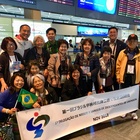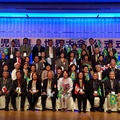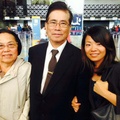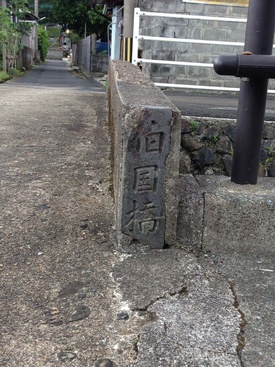
"You know the Hakukoku Bridge in Uken Village? That was built by my father," says Kazuko Fumioka (74). "Before, it was a wooden bridge, but it would always get washed away during typhoons, so it's now a drum bridge. It was always getting washed away, so my father built it. The people of Yuwan 1 (a native of the village who lives in Brazil) collected donations and asked for them to be used in the village. It was money they received from Brazil, so they had to leave it. They decided to build a bridge. It must have been 61 or 62 years since it was built. Now, part of it has collapsed. It's such a shame. It's such a memorial."
In 1957, Kazuko and her family moved to Brazil. "It took 43 days (by boat), but it was fun. I didn't get seasick." They set sail from Kobe Port in November. The Pacific Ocean was rough in midwinter. "It was just like the seawater splashing on the deck. The long table where we ate was shaking, and it went out and came back again. It was amazing." Once they entered the Atlantic Ocean, the sea was calm, like a basin filled with water. The moon and the sun were beautiful and they always watched them from the deck.
Ten days after arriving in Brazil, my four-year-old brother said, "Dad, let's go home. I want to go home." He just wanted to come and play. There was no electricity in Brazil. "We had electricity in Shima, too."
I moved every year in search of better farmland. In my fourth year, I worked on an Italian farm. The house had a kitchen, a hall, and two other rooms. The toilet had flushing water. Of course, there was electricity. It was completely different from farms owned by Japanese landowners.
Kazuko's father was a repeat immigrant. Before the war, her grandfather brought his family to Brazil as immigrants. In addition to growing coffee, he also grew rice and made money selling it in town. Four years later, he had made a fortune and returned to Japan, leaving her father and his brother behind. Her father and his wife bought land and grew cotton. Ten years after arriving in Brazil, her father also returned. His grandfather, who had made money in Brazil, had acquired some land, so he grew rice. She heard that they "didn't even have to take rations."
Kazuko and her siblings were born, and they had land that they had purchased before the war, so they decided to go to Brazil again. When they arrived in Brazil, the land they had been counting on had already been sold, and there was nothing left. Their 74-year-old grandmother came along with them, saying, "I want to go to Brazil with my grandchildren, who I have been carrying on my back, and my wife, who has been with me ever since we got married." They went to a Japanese farm and grew tomatoes together as a family.
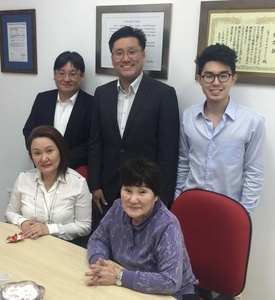
She married Masaru Fumioka (Uken Village), who had come to Brazil as a young man from Cotia. They were blessed with three children. Her father went to the city and started a business, but Kazuko and her family continued to grow tomatoes.
In 1987, I grew cauliflower. It was good, but just before harvesting, hail fell and it was completely destroyed. The cauliflower I had worked so hard to grow was completely destroyed right before my eyes. I was shocked. I decided to quit farming and opened a store selling embroidery thread and wool. My children had grown up, so I no longer had to work so hard.
My grandfather and father made a fortune in Brazil before the war and returned to Japan. After the war, my father returned to Brazil. "He must have really loved Brazil," I said. The "Hakukoku Bridge," which Kazuko's father helped build, continues to connect Amami and Brazil, carrying on the memories of the Brazilian immigrants to Amami.
Editor's note:
1. Yu Bay: Uken Village, Oshima District, Kagoshima Prefecture
*This article is reprinted from the Nankai Nichinichi Shimbun (May 24, 2018).
© 2018 Saori Kato


